Reyner Surname Ancestry ResultsOur indexes 1000-1999 include entries for the spelling 'reyner'. In the period you have requested, we have the following 186 records (displaying 151 to 160): Single Surname Subscription | | | Buying all 186 results of this search individually would cost £984.00. But you can have free access to all 186 records for a year, to view, to save and print, for £100. Save £884.00. More... |
These sample scans are from the original record. You will get scans of the full pages or articles where the surname you searched for has been found. Your web browser may prevent the sample windows from opening; in this case please change your browser settings to allow pop-up windows from this site. Railway Subscription Contracts
(1846)
£121,255,374 0s 8d was promised by about 8,000 subscribers of more than £2,000 to the nearly 556 railway bills deposited in the Private Bill Office during the Session of Parliament for 1846. This alphabetical list gives the full names of the subscribers (surname first), description (i. e., occupation), place of abode, a numerical reference to the title of the railway, the amount subscribed to each, and total. There is a separate key to the titles of the railways.REYNER. Cost: £4.00.  | Sample scan, click to enlarge

| Electors for Armley
(1848)
On 14 and 15 December 1848 an election took place for a Knight of the Shire for the West Riding of Yorkshire in the House of Commons. The candidates were Edmund Denison and sir Culling Eardley Eardley, gaining 14,743 and 11,795 votes respectively. The county franchise at this period included freeholders of land worth 40s or more a year; £10 copyholders and long-leaseholders; and £50 short-leaseholders and tenants. This poll book was published in 1849.
Former poll books had been compiled from the sheriff's returns; but as these were now transmitted to the Home Office immediately after an election, in this instance the polling was marked from the check-clerk's returns, carefully compared with the registers marked in the poll booths at the time of voting.
The votes for the respective candidates are indicated by the numerals 1 (Denison) and 2 (Eardley). The omission of these numerals indicates that the elector did not vote. Many names which appear on the register of particular townships are completely omitted in this poll book: in all these cases, the same name will be found recorded in some other township, the elector having two or more qualifications. In such cases, his name only appears in the poll book in the actual township for which he chose to vote; or, if he did not vote at all, in that township for which he was qualified that lay closest to his actual residence.
The townships are arranged alphabetically within polling district; and within each township the names are arranged alphabetically by surname and christian name, and the elector's residence is given. Many of the electors resided outside the township for which they were qualified - some in other counties. Moreover, at the end of each polling district there is a list of persons registered to poll in that district, from townships is other districts. REYNER. Cost: £4.00.  | Sample scan, click to enlarge
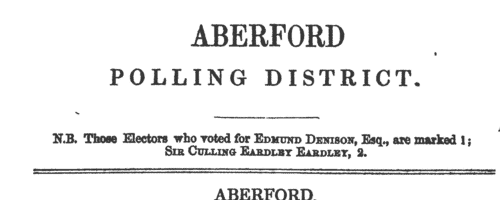
| Electors for Quick
(1848)
On 14 and 15 December 1848 an election took place for a Knight of the Shire for the West Riding of Yorkshire in the House of Commons. The candidates were Edmund Denison and sir Culling Eardley Eardley, gaining 14,743 and 11,795 votes respectively. The county franchise at this period included freeholders of land worth 40s or more a year; £10 copyholders and long-leaseholders; and £50 short-leaseholders and tenants. This poll book was published in 1849.
Former poll books had been compiled from the sheriff's returns; but as these were now transmitted to the Home Office immediately after an election, in this instance the polling was marked from the check-clerk's returns, carefully compared with the registers marked in the poll booths at the time of voting.
The votes for the respective candidates are indicated by the numerals 1 (Denison) and 2 (Eardley). The omission of these numerals indicates that the elector did not vote. Many names which appear on the register of particular townships are completely omitted in this poll book: in all these cases, the same name will be found recorded in some other township, the elector having two or more qualifications. In such cases, his name only appears in the poll book in the actual township for which he chose to vote; or, if he did not vote at all, in that township for which he was qualified that lay closest to his actual residence.
The townships are arranged alphabetically within polling district; and within each township the names are arranged alphabetically by surname and christian name, and the elector's residence is given. Many of the electors resided outside the township for which they were qualified - some in other counties. Moreover, at the end of each polling district there is a list of persons registered to poll in that district, from townships is other districts. REYNER. Cost: £6.00.  | Sample scan, click to enlarge
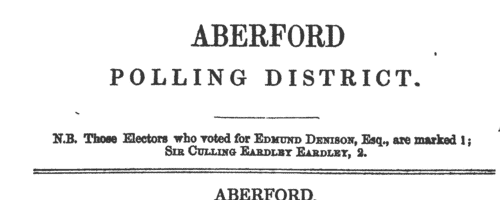
| Pupil Teachers in Yorkshire: Boys
(1851)
The Committee of Council on Education awarded annual grants for the training and support of pupil teachers and stipendiary monitors in schools in England, Wales, Scotland, the Isle of Man and the Channel Islands. Pupil teachers started training between the ages of 13 and 15, and 'must not be subject to any bodily infirmity likely to impair their usefulness as Pupil Teachers, such as scrofula, fits, asthma, deafness, great imperfections in the sight or voice, the loss of an eye from constitutional disease, or the loss of an arm or leg, or the permanent disability of either arm or leg, curvature of the spine, or a hereditary tendency to insanity'.
They also had to obtain certificates from the managers of the school (and their clergyman, in the case of Church of England schools) as to their moral character and that of their family; good conduct; punctuality, diligence, obedience, and attention to duty; and attentiveness to their religious duties.
This detailed statement in the annual report of the committee for the year ending 31 October 1851 lists schools by county, giving:
1. Name and Denomination of School, with these abbreviations - B, British and Foreign School Society; F. C., Free Church of Scotland; H. C., Home and Colonial School Society; N., National Society, or connected with the Church of England; R. C., Roman Catholic Poor-School Committee; Wesn., Wesleyan Methodist.
2. Annual grants conditionally awarded by the committee in augmentation of teachers' salaries, and in stipends to apprentices, and gratuities to teachers.
3. Month in which annual examination was to be held.
4. Names of apprentices, giving surname and initials, and year of apprenticeship. Stipendiary monitors are indicated by (S. M.).REYNER. Cost: £6.00.  | Sample scan, click to enlarge
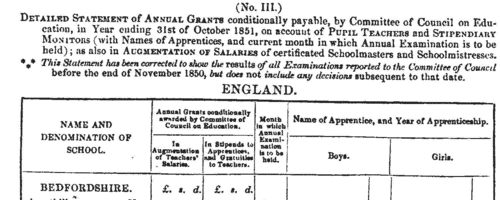
| Inhabitants of Leeds, Yorkshire
(1853)
William White's directory lists traders, farmers and private residents in the area. REYNER. Cost: £6.00.  | Sample scan, click to enlarge

| Missionary donations from Lancashire
(1855)
The Congregational and a number of other independent churches together formed the Evangelical Alliance, committed to promoting and supporting missions to the heathen. The areas chosen for their projects were Guiana, South Africa, India, the South Seas and China. The work of the missionaries was not only in preaching the Gospel, but also in translating the Bible into local languages, and establishing churches, schools and orphanages. Orphans and native teachers were often given the names of principal contributors or congregations back in Britain. In Britain the large amounts of money needed for this work were raised among the Congregational and independent congregations, arranged by auxiliaries for each county (although some contributions for each county might in fact come in from congregations and individuals in neighbouring areas); money was gathered by ministers, at special services, by supporters, and in missionary boxes. The accounts of all these contributions were published as part of a monthly magazine called the Evangelical Magazine. Each issue of the magazine carried obituaries of prominent members of the congregations; general articles on religion; reviews of newly-published religious books; home news, mainly about meetings of importance or interest by the alliance or in individual churches; and then a separate section called the Missionary Chronicle. The Missionary Chronicle was devoted to letters and reports from the missionaries; and concludes with a set of accounts of donations towards the missionary work. This is the index to the donations reported in the magazine, January to December 1855, from Lancashire.REYNER. Cost: £6.00.  | Sample scan, click to enlarge
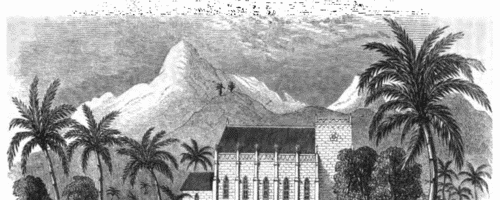
| Dissolutions of Partnerships
(1856)
Trade partnerships dissolved, or the removal of one partner from a partnership of several traders, in England and Wales
REYNER. Cost: £6.00.  | Sample scan, click to enlarge

| Anglican Clergy in England and Wales
(1858)
The Clergy List for 1858 includes this comprehensive list of Anglican clergymen in England and Wales, whether beneficed or not. The names are arranged alphabetically by surname, and christian name or initials, with degree, and current office.REYNER. Cost: £4.00.  | Sample scan, click to enlarge

| Boys entering Cheltenham College
(1863)
Cheltenham College 'was founded in order to provide for the sons of gentlemen a Classical, Mathematical, and General Education of the highest order, on moderate terms, in strict conformity with the principles and doctrines of the Church of England.'
Andrew Alexander Hunter, the college registrar, compiled the first edition of the College Register in four parts from 1883 to 1886: these merely listed the boys by term of entry, with their dates of birth and names and addresses of their fathers. Circulars were also sent out to all Old Cheltonians whose addresses were known, requesting additional details. On the basis of the returns from these and Hunter's further researches, this much fuller register was published in 1890.
The information after each boy's name is given (where known and applicable) in this format: father's full name and address as of the time the boy entered the college; class and department on entering the college (classes being number from 1 downwards, and these again divided into A and B, some into C and D, others into P (Principal's side) and V. P. (Vice-Principal's side) - 1A was the highest class in each department: besides this, certain others were called Addiscombe, Woolwich, Civil, Direct, Line, Sandhurst, Naval, Special, Preparatory, Latin, and India Civil) and the same on leaving, name of Boarding House (or 'Day Boy'), scholastic and athletic honours attained at the college, and subsequent career (including date and place of death, or present address in 1890, if known).REYNER. Cost: £4.00.  | Sample scan, click to enlarge
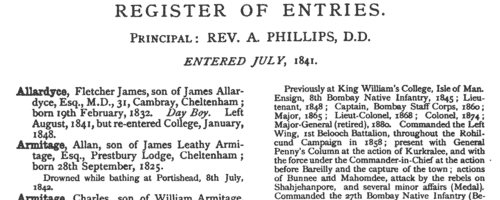
| Missionaries and contributors
(1863)
The Evangelical Magazine and Missionary Chronicle records the work of Christian missionaries throughout the world, and of the supporting missionary societies collecting money for the work in the British Isles. Contributions are listed by congregation, and by family members making donations.REYNER. Cost: £8.00.  | Sample scan, click to enlarge
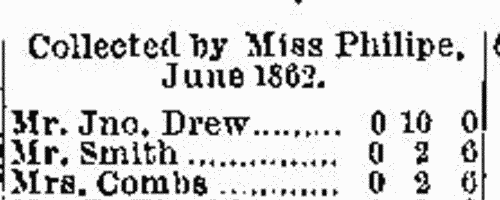
|
Research your ancestry, family history, genealogy and one-name study by direct access to original records and archives indexed by surname.
|












